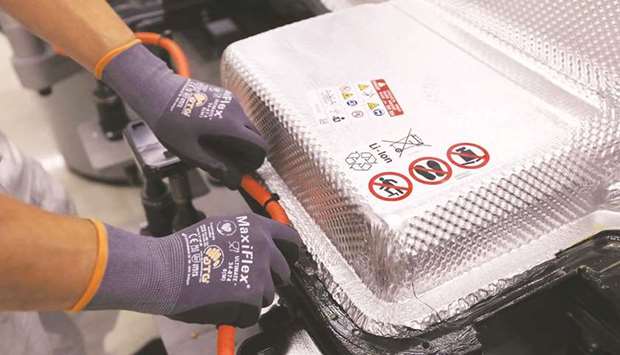Two South Korean electric-vehicle battery makers reached a last-minute settlement in a bitter US trade dispute, sparing President Joe Biden from choosing between undermining intellectual property rights or dealing a politically toxic blow to his climate agenda.
SK Innovation Co agreed to pay 2tn won ($1.8bn) to LG Energy Solution, a unit of LG Chem Ltd, according to a statement from the two companies. The payment is divided equally in cash and royalties, they said.
The two companies “will work to help the development of EV battery industry in South Korea and the US through healthy competition and friendly co-operation,” according to the joint statement. “In particular, we will work together to strengthen the battery network and environmentally-friendly policy that the Biden administration is pursuing.”
The settlement will avert a 10-year import ban of SK Innovation’s batteries into the US and ends the two-year dispute between the two companies. The import ban threatened to complicate the rollout of Ford Motor Co.’s new F-150 electric pickup truck and the Volkswagen AG’s ID.4 SUV, both due to begin production next year with EV batteries assembled at an SK Innovation plant in politically important Georgia.
The dispute became a political conundrum for Biden because it was said to jeopardize as many as 6,000 battery manufacturing jobs in Georgia, prompting the state’s two Democratic senators and Republican governor to urge an intervention by the president. One of those senators faces re-election next year.
“This settlement agreement is a win for American workers and the American auto industry,” Biden said in a statement Sunday. US Trade Representative Katherine Tai said the deal follows “significant engagement” by the administration.
SK and LG also agreed to withdraw all lawsuits lodged in South Korea and overseas, according to the statement. They also agreed not to undertake any legal action against each other for the next 10 years.
The settlement removes a major headache for both South Korean and US government officials, who’ve spent weeks pressing the two sides to reach an agreement. Biden was facing an April 11 deadline to decide whether to overturn the import ban or do nothing and let it take effect. His decision pivoted on two critical policy issues – the new president’s desire to promote EVs as a way to help curb climate change, and the nation’s long-standing backing of strong intellectual property rights.
The US International Trade Commission, an independent agency set up to protect US markets from unfair trade practices, had issued the import ban February 10 based on what it called an “extraordinary” effort by SK Innovation to destroy evidence in a trade-secret case lodged by LG Energy. The ITC did carve out time to let SK Innovation import components for batteries to be assembled in Georgia for Ford and Volkswagen vehicles, but the automakers argued it was not enough.
“A voluntary settlement between these two suppliers is ultimately in the best interest of US manufacturers and workers,” Ford’s chief executive officer Jim Farley tweeted after the ITC’s decision in February.
“We are pleased the two battery suppliers at the centre of this recent trade dispute have come together and solved their differences,” Scott Keogh, president and CEO at Volkswagen Group of America, said in a statement. “Our complete focus now shifts to where it should be; the start of US production of the all-electric ID.4 SUV in 2022, assembled by proud, skilled workers in Tennessee.” Tai, who has been in her position less than a month and whose office is designated to take the lead in these cases, held meetings with the parties as the deadline loomed. Georgia officials, including the two recently-elected Democratic Senators critical to Biden’s agenda, also met with senior company executives and administration officials.
The case prompted an extraordinary effort to lobby the Biden administration, with near-daily meetings over recent weeks involving officials from a dozen government agencies and officials from both companies and the automakers. LG and SK spent more than $1mn last year on lobbying efforts, according to data collected by the Center for Responsive Politics.
Senator Jon Ossoff “was stressing the urgent need for both companies to come to the negotiating table and agree to a settlement to save the Georgia plant,” said Miryam Lipper, a spokeswoman for the Democratic senator. His fellow Democrat, Senator Raphael Warnock, who’s up for re-election in 2022, also had called for a resolution, describing the looming import ban as a “severe punch in the gut” to Georgia’s workers.
Georgia Governor Brian Kemp, a Republican, called on Biden to veto the import ban while accusing the president of responsibility for Major League Baseball’s decision to move its All-Star game because of the state’s new voting law and costing the state jobs.
SK Innovation argued the order would undermine Biden’s push for more American-made EVs as part an effort to combat climate change.
The commission said it had already taken the president’s policies into account when fashioning a carve-out that allowed SK Innovation to bring in components needed for Ford’s EV F-150 pickup for four years, and for Volkswagen’s American ID.4 SUV line for two years. Neither carmaker was appeased.
LG Energy, which makes batteries for General Motors Co in Michigan, said such a decision would weaken policies to protect trade secrets – a long-standing issue in US talks with China – and that the carve-outs ensures Ford and Volkswagen had time to adjust.

An employee secures battery pack cable on a Volkswagen e-Golf electric automobile.
